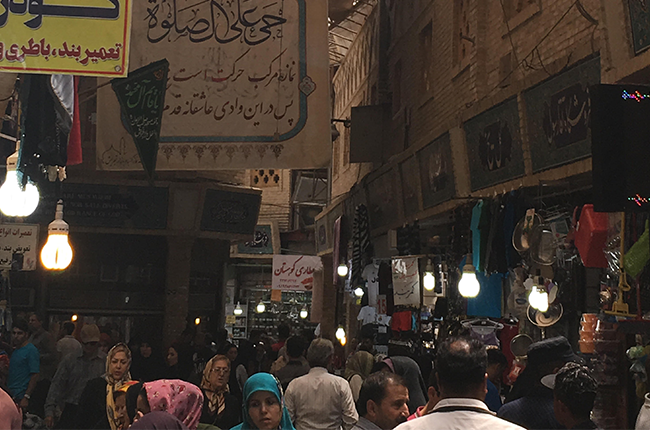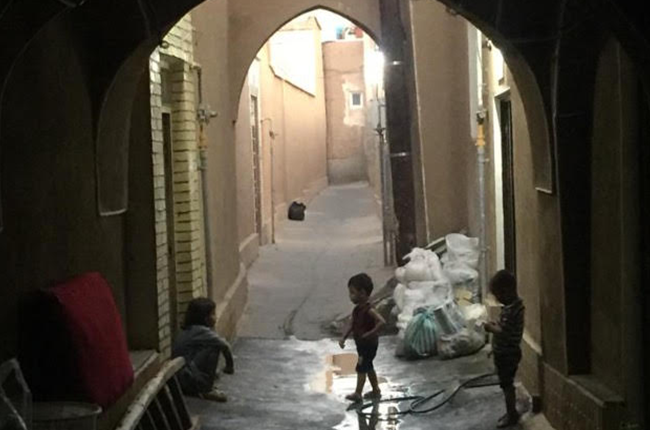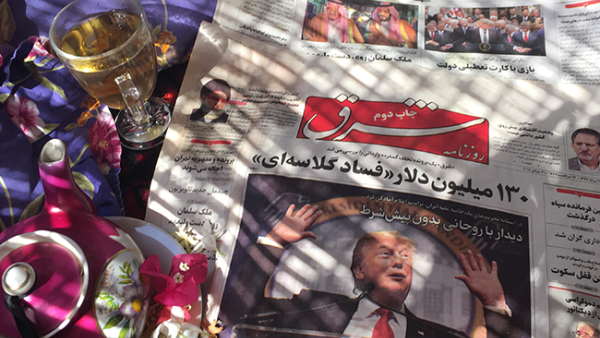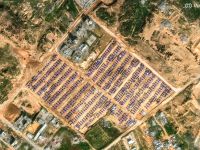Veena Ali-Khan
The US has had a policy of imposing sanctions against Iran for the past 40 years with little concern over the human cost involved.
Having spent considerable time in Iran, I can confidently claim that Trump’s punishing use of sanctions has only strengthened Tehran’s most reactionary forces, while weakening Iranian civil society.
The sanctions hurt ordinary Iranians far more than their leaders. Ordinary people are hit massively via shortages of daily essentials as Iran is cut form the International financial system.
Similarly to most of America’s ideological conflicts in the Middle East - it is the ordinary people who suffer.
The initial round of re-imposed sanctions has already impacted the Iranian economy and exacerbated popular unrest. Sanctions in August targeted the machinery and gold industries, the automotive sector and the purchase of U.S. dollar banknotes causing the currency to drop by 30 per cent.
The EU has offered 20 million dollars in aid to Iran in an effort to offset some of the sanctions’ impact. Although, regardless of these efforts, and those of China and Russia, Iran’s economy is set to suffer as the currency continues to significantly devalue. Iran hawks in Washington DC have done everything in their power to jeopardise the Joint Comprehensive Plan of Action (JCPOA), and will carry on doing so predominantly through sanctions.
The second wave of sanctions in November will undoubtedly inflict far more pain on the Iranian economy by prohibiting other countries from buying oil, at the risk of third party sanctions from the US. Oil is most dominant in the structure of Iran’s foreign trade and makes up 80% of Iranian public revenue. Without this income the country will be unable to afford the necessities. This is despite the confirmation from the International Atomic Energy Agency (IAEA) that Iran continues to abide by its obligations.
With the sanctions against the Iranian petroleum industry in conjunction with the decrease of foreign money coming in to the country, unemployment and inflation will increase which lays the foundations for more civil unrest.
Talk of sanctions is repeated so much in US foreign policy that people rarely question their morality or efficacy. Sanctions which are unrelated to the civilian population have dire consequences.
The 2010-2012 sanctions imposed against Iran during the Obama presidency targeted Iranian companies and isolated the country from the international financial system. These sanctions were aimed against the regime when in reality the percentage of Iranian families living in poverty increased, and millions were left without access to essential medical treatment.
In August 2013, a group of Iranians which included political prisoners wrote a letter to President Barack Obama criticising his sanction policy:
‘The Iranian people see themselves as victims to tensions between the U.S and Iranian governments...[They] have reached the conclusion that the sanctioning countries don’t care about the human rights and, to compel the Islamic Republic to accept their demands, they target the Iranian people.’ (Reuters)

/Veena Ali-Khan, Al Bawaba
Undoubtedly, Sanctions have affected the lives of many Iranians residing in and out of the country, whether it be through unemployment, limitations to studying abroad, sending money in and out of the country to relatives, lack of access to medication for life threatening diseases or difficulty in obtaining food produce. Over the past 29 years there has been at least 200 accidents involving Iranian commercial flights, killing over 20000 citizens. These accidents are blamed on the limited access to sanctioned aeroplane parts. Many Iranian aircrafts are recognised as the oldest planes in the world, predating the 1979 Islamic Revolution.
Iran’s youth may be the biggest victims of US aggression. In a country where education is highly centralised, youth are eager to travel abroad to pursue research projects or attend prestigious universities. For those whose families can afford it, studying abroad is an advantage that ensures students a respectful career for when they return home.
With recent currency fluctuations pushing the Iranian Rial down to about a third of its value against the US dollar, foreign degrees are becoming so expensive that even students that have not yet finished their degree are being forced to return home.
Even for those that can overcome the latest currency drop, families are still unable to send money to their children studying abroad as it is impossible for Iranians to transfer money to Western banks. The only solution is to carry bags of suitcases packed with money when travelling from Iran (a technique commonly used by Iranian dual citizens).
Iran is not the only country where the human costs of US sanction has been overlooked. The economic sanctions that the United Nations Security Council imposed on Iraq after the Gulf War for almost 13 years, sharply restricted all foreign trade. Allegedly, as a direct consequence of these economic sanctions 500,000 Iraqi children died.
Those who suffered most had not themselves been connected to the issue of nuclear weapons, which very existence was questionable, or the invasion of Kuwait. This policy in effect punished the Iraqi people in the most barbaric way possible.
Trump is convinced that if the economy gets bad enough- the regime will fall to the hands of the MEK; an internationally recognised terrorist group that Trump hopes to use to overthrow the Ayatollah’s regime. Not only does this demonstrate a lack of understanding of Iranian history and internal policies, but is highly hypocritical.
The MEK incidentally opposed Khomeini’s decision to release the 52 American embassy staff held hostage by Iran in 1979 and instead called for their execution. Goes to show that this administration’s Iran strategy is blatant destabilisation masquerading as economic sanctions.
In despite of 40 years of continuous international sanctioning, Iran still maintains a foothold in Syria, influence in Iraq and growing involvement in Yemen. If anything, Iran has increased its hegemony in the Middle East. This is by virtue of the 2003 US led invasion of Iraq which resulted in the destabilisation of the regional order. Thus, rather than threatening the regime directly, the sanctions are designed to ferment civil unrest (and the consequence destabilisation of the regime) via the suffering of ordinary citizens.

Veena Ali-Khan, Al Bawaba
The US Military’s Central command which oversees U.S forces in the Middle East said on August 1st that it had seen an increase in Iranian naval activity: “We are aware of the increase in Iranian naval operations within the Arabian Gulf, Strait of Hormuz and Gulf of Oman,” 4 said Navy Captain Bill Urban in an interview with Reuters.
The Trump administration takes the moral high ground when it comes to human rights abuses committed by the regime, yet the evidence seems to show economic sanctions impact the very people whose rights the intervention seeks to protect. Either this is not the tool to fix the rights of the Iranian population or the mechanics need to be candid about which parts they are trying to fix or remove.
The US and its allies in Riyadh and Tel Aviv ought to be transparent in their intention to weaken the Iranian government at any cost, and stop hiding behind the professed desire to protect human rights whilst simultaneously worsening not the regime, but the rights and welfare of orinary Iranians.
Veena Ali-Khan is a MENA focused researcher based between London and Amman.







